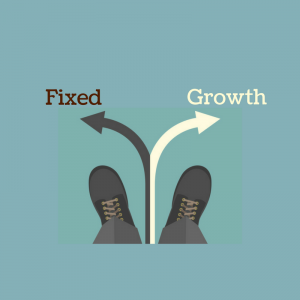I don’t know about you, but there have been many times in my life when I gave up because I thought the task was too hard or I wasn’t good enough. A specific example of this comes to mind when I think about my freshman year in college. I needed a math elective so I signed up for calculus. I thought I would be good at it because I was an A+ student in high school math and physics. Boy. Was I mistaken! From the moment I walked into the class, I realized I was in over my head and rather than seek help, I dropped out. It wasn’t until I read Carol Dweck’s book on Mindset that I understood why I did what I did.
The word “mindset” is often used to rationalize our rote behaviors or preferences. Our understanding of mindset has evolved due to the 20-years of research done by Dr. Dweck. She took on this study as a graduate student because she wanted to understand why, given the same set of circumstances, some students gave up while others kept on trying. Through countless experiments in various  settings, she came to the realization that we have two possible mindsets: A fixed mindset where we believe our attributes are carved in stone and a growth mindset where we believe our innate characteristics and traits can be developed through effort. Her research builds on what neuroscientists have learned – that our brains are malleable and change as a result of experience.
settings, she came to the realization that we have two possible mindsets: A fixed mindset where we believe our attributes are carved in stone and a growth mindset where we believe our innate characteristics and traits can be developed through effort. Her research builds on what neuroscientists have learned – that our brains are malleable and change as a result of experience.
The mindset you adopt has a profound impact on what you do. Circling back to my college experience, I had a fixed mindset. I thought I was good in math (fixed trait). Freshman calculus showed me I wasn’t (I felt stupid). So, I quit. If I had approached the class with a growth mindset, I would have started from the same place (I was good in math) and I would have embraced the challenge due to my belief that effort leads to learning.
Let’s transition to how mindset shows up at work. Consider these two scenarios: (1) People who view every situation as a confirmation of how smart, clever and/or competent they are; or (2) People who are open to feedback, even if it is unflattering. Which one indicates a growth mindset? (Hopefully, you answered 2). How about this one? (1) People who say, “I’ll never be good at that”; or (2) People who say, “I am up to the challenge.” The growth mindset is pretty obvious, right?
Imagine how different life would be both on and off the job if we approached it through the lens of “our abilities and behaviors are something we can cultivate” as compared to “our abilities and behaviors are fixed.” None of us has an all fixed or an all growth mindset. The choices you make spring from your beliefs. Monitor your thoughts and self-talk. Catch yourself. Like the little engine that could, coming from a place of “I think I can” will take you far.
Reference
Dweck, C. S., Ph.D. (2008) Mindset. New York: Ballantine Books.
![]()
0 Comments Leave a comment